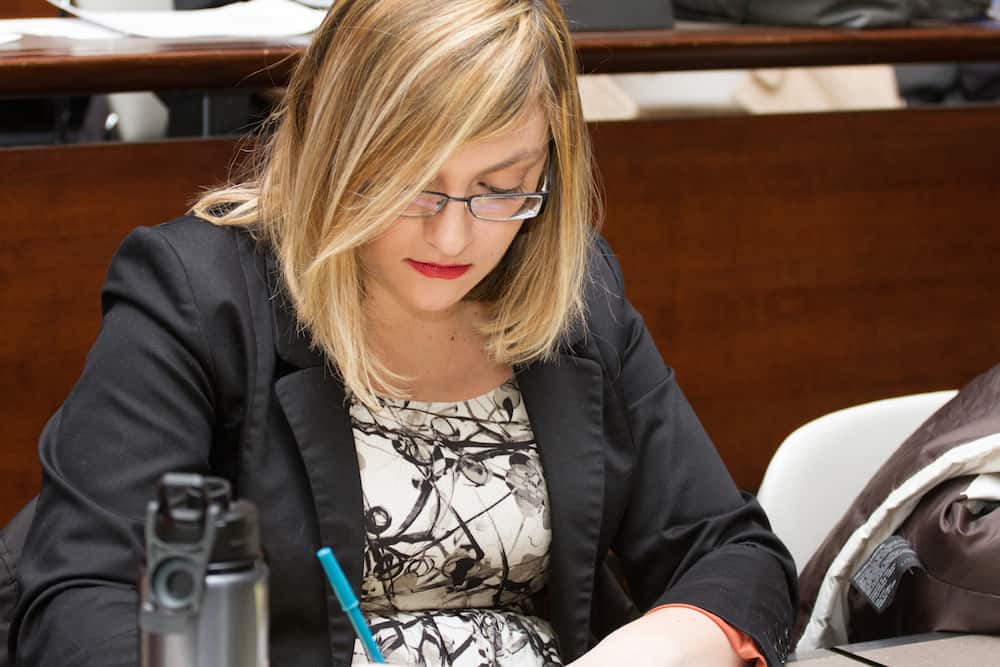On Friday, February 28, third-year English specialist and Trinity College student Amanda Brown says she was interviewed for a position as poll clerk for the UTSU elections. Brown had recently quit a two and a half year job at McDonalds and was looking for some work experience, and a little extra money. “I’d wanted to get involved in student politics for awhile, but I hadn’t because I didn’t want to be involved in the bigger issues, like defederation,” explained Brown. “This position meant I wouldn’t have to campaign for anybody, I didn’t have to pick a side, the whole point was to be impartial.”
According to Brown, the interview went well, and ended with her being offered the position. Brown says she signed and returned both a contract and a non-disclosure agreement, was given some tax forms, and was told to return on Tuesday for further training. Then, on Monday morning, she woke up to find a confusing email in her inbox.
“I had an email from this Alex Flor person, and they said they were the CRO,” said Brown. The email explained that after further examination Brown was not suitable for the position, stating: “Unfortunately, due to the positions you hold on campus, your ability to act impartially and in an unbiased member while conducting the duties of polling has the potential to draw concern from both the membership & candidates.” Brown provided The Varsity with copies of the email exchange between her and Chief Returning Officer (CRO) Alex Flor.
The Varsity contacted Flor on Monday morning, with a deadline of 9:00 pm Monday evening. At 9:00 pm Flor replied: “I’ve passed this along to Munib Sajjad, as the head of the ERC, to answer your questions.” Flor was asked to respond to the claims made by Brown, either over the phone or by email. Her deadline was extended until 12:00 pm Tuesday, and then again until 2:30 pm Tuesday. Flor has not provided any further comment.
At 2:30 pm on Tuesday, Munib Sajjad, current UTSU president and chair of the Elections and Referenda Committee (ERC), replied on Flor’s behalf, saying that more people had applied to be a poll clerk than there were positions available, and asserting that the hiring process was fair: “The UTSU does not discriminate in the hiring of any employees based on college. When elections staff are hiring poll clerks, they are instructed to ensure that successful applicants do not have an affiliation with the UTSU or with any elected divisional student society marked on their resume or mentioned in their interviews,” said Sajjad.
Brown, who says she has never held any leadership positions in her time at U of T, was confused after receiving Flor’s email on Monday. She says she emailed Flor asking for further clarification and dropped by the UTSU office later that day.
At the office, Brown says she spoke to Janina Kotowski, the Deputy Returning Officer (DRO) who originally interviewed and hired her. Brown claims that Kotowski told her that the concerns about her impartiality were based on her involvement with the Trinity College Meeting (TCM).
Brown says she listed that she was a member of the TCM on her resume in order to be both upfront about her college, which she knew to have an at-times fractious relationship with the union, and to show that she was in fact impartial. “Under school activities I listed that I was both a member of the UTSU and of the TCM, to show that I was impartial — it was on my application and I said it during my interview,” she said.
Brown says she reiterated this point to Kotowski, and explained that all Trinity students are members of the TCM, but was still denied the position of poll clerk. “She said ‘I thought you had a great interview, but Alex went through and saw that and was worried and raised some concerns because there’s been some problems with Trin.’ And they said, ‘we don’t know how involved you are,’” says Brown.
Kotowski was asked to confirm or deny the statements Brown attributes to her, but had not replied to the request as of press time.
Brown describes her involvement with her college as limited to using the service of the registrar, eating lunch in the dining hall, and sometimes walking through the quad. “I would understand if I was maybe the chair of the TCM, but I’ve only been to one or two meetings ever and I’m in my third year.”
The TCM has an unusual structure compared to other college societies at U of T. All students registered at Trinity are considered members of the TCM and are entitled to attend and vote at the TCM, which makes decisions similar to those usually made by elected college councils or boards of directors.
According to the email exchange provided by Brown, after her visit to the UTSU office, Flor contacted Brown offering to meet in person to discuss the decision. Brown responded that she would appreciate a meeting of this kind, to which Flor replied that she was in fact too busy to discuss the matter due to preparations for the upcoming student executives forum.
“I pay my fees, I’m still part of the student union. And on their website they have all this stuff about how they’re inclusive, and everybody’s welcome, and then they do this,” said Brown, adding: “They made a biased judgement, because they thought I would be biased.”
Flor was asked to verify the authenticity of the emails provided by Brown, and did not do so. She also did not reply to questions regarding whether she knew all Trinity students are members of the TCM or whether she is allowing any Trinity student to be a poll clerk. The only reply received from Flor is quoted above.


